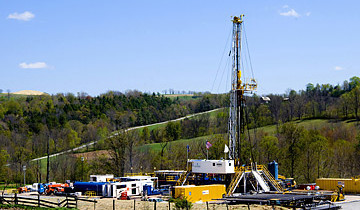Raise the pressure
FOR all the debate about it, Britain’s shale-gas industry is minuscule. Whereas roughnecks in America have sunk many thousands of wells since a boom began more than a decade ago, Britain has fracked at only one test site, in Lancashire, and not since 2011. In a report published on May 8th, an all-party group from the House of Lords said that speeding shale-gas exploration should be an “urgent national priority”. So far, so familiar—and entirely in tune with the position of the coalition government. But the authors go on to blame the government, not green campaigners, for holding the frackers up.The Lords’ economic-affairs committee argues that shale gas could boost Britain’s economy while reducing its dependence on imports. It says that proper oversight can limit the environmental and health risks associated with fracking. And it recognises that burning more gas instead of coal—which is still used to generate more than one-third of Britain’s electricity—could be a cheap and sustainable way to lower the country’s carbon emissions while waiting for pricey renewable technologies to mature.
But a thicket of regulation has slowed progress to a crawl. Although dozens of test wells are needed even to calculate the extent of Britain’s shale-gas reserves, Cuadrilla, an oil and gas firm, reckons it could take more than a year to get clearance for each site. Part of the problem is that several government agencies share responsibility for approving fracking applications. The Lords worry that unwieldy rules will not make the business much safer but could prod shale-gas firms into seeking far richer pickings abroad.
Complaints about bureaucracy are embarrassing to a government that has promised to go “all out for shale”, and which is busily finding ways to stop critics beyond Westminster from holding up the industry. It has persuaded shale-gas firms to put £100,000 ($170,000) into a fund for local causes each time they drill a test site. In January it promised to let local councils keep all the money frackers pay in business rates, up from half at present. Next month it will probably announce plans to make it easier for fracking firms to drill tunnels deep beneath people’s homes.
Pushing through that proposal will mean fending off noisy opposition from environmental lobbies such as Greenpeace, which had hoped its supporters could use Britain’s aged trespass laws to make life difficult for shale-gas boosters. Such campaigns carry weight while most Britons are still making up their minds about the industry. The proportion in favour of fracking has shrunk since lively protests erupted at a drill site near Balcombe in Sussex last summer; it may keep sliding until a few pioneers prove it can be safe and unobtrusive. All the more reason to get cracking.
Fonte: The Economist



